Tagged: Business
How to Use Twitter to Create Connections & Grow Your Business
- by Alyson Shane
Earlier this week I got together for a mini-tweetup or sorts with some local ladies that I know through a Twitter chat that I participate in. We had some lunch, enjoyed some laughs, and got to know each other a little better.
That experience got me thinking about the value of Twitter as a social network, and how easy it can be for people to find each other, create connections, and even grow their businesses.
As many of you know, Twitter is my favourite social network and I believe that the community I found online helped shape me into who I am today.
With that in mind, I wanted to share some benefits that I believe Twitter can have for you and your business, so let's get started:
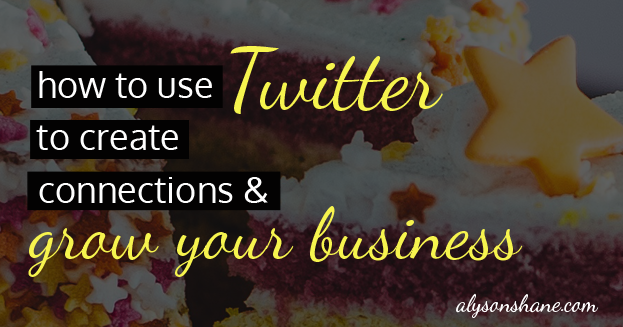
Interact with real people
One of the biggest objections I hear to Twitter is "I'll never meet real people! It's just brands and businesses!"
Not so, young social media Padawans. Not so.
One of my favourite stories to tell about social media was how I met my good friend Colin. I was pretty green to Twitter (circa 2009 or 2010) and I tweeted out something like "are there any meetups for creative types in #Winnipeg?" Colin tweeted at me, we proceeded to meet up at the next Secret Handshake meetup, and we've been friends ever since.
I talk about this a little bit more in my post How Social Media and Blogging Helped Me Discover Who I Am, but it's worth repeating here that Twitter is an excellent conversation tool because it democratizes your feed.
Currently Twitter's timeline is largely comprised of people you follow and you see their tweets in chronological order, allowing you to tweet at basically anyone you want, anytime. This means that you can connect with a celebrity, talk to a brand, or just reach out and start chatting with other people from your hometown, and you're all on the same playing field.
Create genuine, real-life connections
One of the secrets to using Twitter isn't to just tweet and expect people to find you. Sure, replying and RT'ing is a lovely way to let people know that you're out there, but finding twitter and participating in Twitter chats is one of the fastest ways to start seeing connections grow.
Essentially a Twitter chat is a chat hosted on Twitter which uses a chat-specific hashtag (this thing: #) to help users identify and respond to one another. Twitter chats tend to be grouped around themes or topics and can range from chats about beer, to parenting, to disability rights, and more!
One of my favourite weekly chats is #wecmchat, which is hosted by the Women's Enterprise Centre of Manitoba, and focuses on fostering discussion about business ownership and being a woman in business. I've met lots of local lady business owners in the year or so that I've been participating in the chat, and some of us even got together to grab lunch at a burger joint just outside the city:
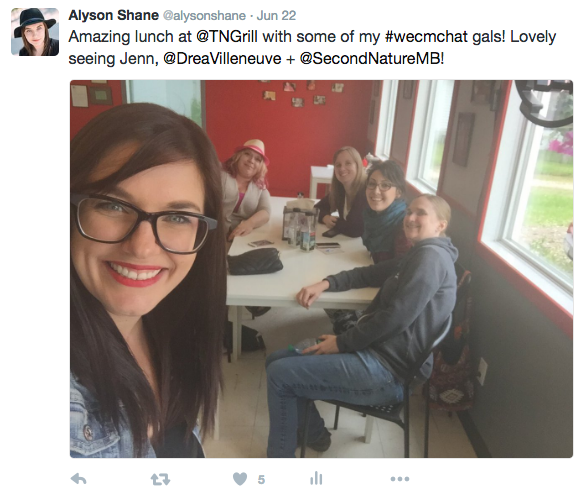
What's great about this chat is that I've met other like-minded people (my "tribe") and have formed connections with them that may not have existed otherwise, and gotten to know them in ways that I may not have if we'd only run into each other face-to-face.
This is the power of Twitter chats: to be able to get to know other people with similar interests, goals, and beliefs in informal and regularly scheduled times.
Grow your business
Twitter can absolutely convert those conversations to paying customers, but you have to put in the effort. Twitter doesn't have a quick ROI, so don't expect to go from 4 followers to 4,000 overnight unless you bought them from somewhere, which is a whole other topic in and of itself.
That being said, Twitter's power lies in its ability to let a business act like a human being. Unlike on Facebook, where business pages can't interact with personal profiles, businesses can Tweet to personal accounts. For example, if you tweet out "today is my birthday!" your local pizza place may tweet back "happy birthday @yournanehere!"
By engaging in conversation with other users businesses can use Twitter as a way to remind people that their business is there, and to create feelings of familiarity and trust as they engage in casual, positive, and non-salesy conversation.*
(*This is super important! While it's okay to tweet out about sales, special promos, and the like, it's bad Twitter etiquette to tweet anything prompting people to buy from you.)
While Twitter may have a slower ROI, it can absolutely land you clients. I can say this with absolute certainty because I've met clients who have followed me on Twitter and decided to use my services as a result. The more time you invest in talking to others and building connections on Twitter, the better your results will be.
More questions?
If you're still totally baffled by Twitter check out my Twitter Crash Course post series. I'll walk you through setting up an account, to connecting with your first followers, understanding your analytics and more!
Click here to view the project index
When it comes to any social network the most important thing to remember is this: everyone else is there to make connections, just like you. So jump right in and start tweeting!
Do you have any questions about Twitter? Tweet at me or ask me in the comments!
6 Ways Your Small Business Can Save Money
- by Alyson Shane
Recently I received a phone call from my alma mater asking for donations to their Faculty of Arts, where I studied when I received my BA. She asked me for $5 a month, or "the cost of a single Starbucks coffee" (well played, University of Winnipeg, well played).
I'll be honest with you: I declined to give back to the university for the time being. My business is still in it's infancy, and saving money is pretty important to me right now. However, this conversation got me thinking about the ways I work to keep costs low for myself during this stage (even if that means saving that $5 a month), and I thought I'd share some of the things I've learned:
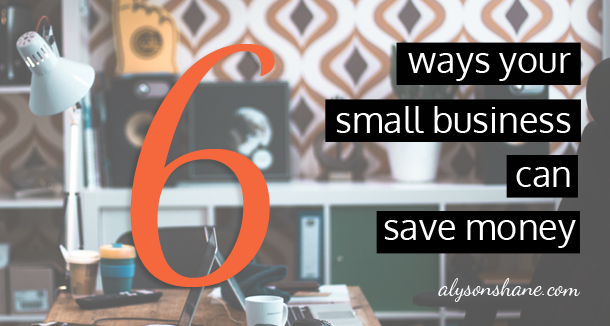
One of the most interesting assumptions that people have started to make about me since I began running my business is that this is the lifestyle I lead:

This is, much to my chagrin, not how I live my life. In fact, it's a little more like this:

Don't get me wrong, I'm doing just fine financially, but I'm not baller status quite yet. As a result, here are some of the areas where I cut costs or try not to indulge in order to keep my business expenses low:
Buying or renting space you don't need yet
One of the easiest ways to save a few hundred dollars a month (minimum!) is to avoid buying a brick-and-mortar store or renting office space for as long as you can. This, in my opinion, is the single biggest benefit to working from home.
Sure, there are benefits to an office or renting a desk in a co-working space, such as access to a board room, printing area, etc, but unless your business has grown to the point where you need those things on a consistent basis, having client meetings in coffee shops should be fine for now.
Spending on expedited shipping
Unless it's a business emergency (ie: your business will shut down without this parcel/package) you can wait the extra day or two.
Additionally, if the shipping charges for a particular item are outrageous, ask yourself: do you really need that beautiful embossed day planner that badly? Odds are, you probably don't.
Custom website design
I get it: you want to build a website that stands out from your competitor's. You want something that is completely yours, and is an accurate online representation of your business and your values.
However, what's more important is simply having a website, rather than worrying about whether or not it's built custom from scratch. Many people choose to work with existing Wordpress or Squarespace templates, which are easy to alter and personalize without the investment in a custom designed site.
Unnecessary advertising
I'm a firm believer that the best thing a person or business can do for themselves is to start to build a positive reputation for themselves online. What's great about this is that social networks like Facebook, Twitter, LinkedIn and Pinterest (the biggest and most popular ones for businesses) are all free to join.
This means that if you do hustle a little bit (or hire someone like me #ShamelessPlug) you can start to build a name for yourself and your services without having to invest in paid advertising just yet.
Not only does putting off doing paid advertising beneficial because it keeps costs low, but people will appreciate that you're connecting with them on a real, human level, and not just sending a barrage of ads their way.
Office supplies you don't need
Confession: I LOVE going to stationery stores. Every time I step into Tiny Feast here in Winnipeg my heart starts going pitter-pat and I start imagining how charming my desk would be with all those fountain pens, notebooks, staplers... you get the drift.
As much as I would love to take everything from Tiny Feast home with me, I have to ask myself: how often do I use a stapler (never), how often do I use paperclips (also never), do I really need a handmade mug to store my pens (not at all)... you get my drift.
As tempting as it may seem to try and pimp out your desk with heaps of Pinterest-worthy goodies, resist the temptation for now. You can always indulge in that gorgeous cork-top desk in the future.
Subscriptions for software you don't need
This one always gets me. I pay for a few subscriptions to various content scheduling and monitoring services (HootSuite, Buffer, etc) and it sucks to pay the monthly fees... but without them I would go absolutely bonkers and not be able to manage my shit. So, for me they are a necessary evil.
However, unless you're in the digital marketing business odds are you can avoid a lot of these monthly expenses by using free software to do what you need. Some great options are:
- Insightly (CRM system)
- Freshbooks (accounting)
- HootSuite or Buffer (free versions - social media management)
- Toggl (time management - I'd be lost without this tool)
- Trello (project management)
- Dropbox (file sharing)
It may seem tempting to invest in expensive software, or to buy a bunch pf products up-front "just in case" but if you aren't using the tool on a daily basis, and if it isn't something that your business can live without (eg: I would be utterly lost without Buffer, for example) then consider sticking with the free version, or finding a free alternative until the time comes when you either a) need the service enough that you should pay for it or b) you can afford to invest in it.
Do you have any money-saving tips for small businesses? Is there something that you wish you had learned when you were starting out? Tweet at me or tell me in the comments!
How to Create Buyer Personas That Work for Your Business
- by Alyson Shane
Let me tell you a dirty secret: I hated building buyer personas when I was taking my business courses in university. I thought they were useless, frivolous, and something that marketing agencies could charge exorbitant fees to their customers to develop.
Then, as it so often happens in the world of Being an Adult, I started running my own business and learned that I was totally wrong.
In fact, understanding and developing buyer personas was, in fact an integral part of understanding a businesses' target audience, and how best to communicate with them.
As I so often say when it comes to advice I dole out on this blog: do as I say, not as I've done. Learn from my mistakes; understand what a buyer persona is and how it benefits your business, and use it to the best of your abilities.
Not sure what a buyer persona is, or how it can help your business? No worries, I've got you covered:

What are buyer personas & what do they do?
At it's core, a buyer persona is essentially a portrait of your ideal customer.
In terms of content marketing strategy, having a comprehensive buyer persona helps businesses (or people like me!) deliver content which is timely, informative, and that your audience actually want to see and consume.
Different people respond differently to various kinda of images, messaging, and communication, and it's important to take these perspectives into consideration while figuring out how to best serve your customers.
For example, a 20-year-old Snapchat user who is starting university and has very little disposable income will have respond to different messages, and will have different motivations, goals, and purchasing power than a 45-year-old father of two who is a CEO at his company and has lots of disposable income. Now, your business may not be trying to appeal to both of these extremes, but what this is meant to illustrate is that you need to know who your ideal buyers are, why they should care about your business, and (more importantly) how your product or service can appeal to them or make their lives easier.
How can you build buyer personas that really work?
The key to building effective buyer personas is that you have to make a bunch of them. This may feel like tedious work (my university-era self would agree) but creating a few personas can help you develop well-rounded ideas about the kinds of people you want to communicate with, and who you think are the ones who would be interested in buying what you have to offer.
You don't have to get super specific, but identifying the following areas are generally pretty useful:
Basic info
- Name. This isn't technically necessary, but I like naming my buyer personas. I find it helps with keeping track of who they are, and makes them feel a bit more "real".
- Job title. Are they CEOs? Mid-level management? Students working at Starbucks? Like I said earlier, where they are in their professional life will influence their purchasing power.
- Details about their job title or role. These flesh out their day-to-day motivations at work and help inform what they may be looking for professionally.
General demographics
- Age. Different generations and age brackets have different motivations and priorities, and it's important to identify what they are in order to figure out what they want.
- Gender. Are you marketing your products to men, women, both, or otherwise?
- Location. Where your ideal customers are can make a huge difference on how you craft your message to them.
- Salary. Lots of people are afraid to talk about money and finances, but let's be honest: how much your buyers have to spend influences whether or not they have monty to buy your products or services.
- Education. People's level of education shapes a variety of areas such as their level of employment, salary, interests, and much more.
- Family. Are they single? Married? Do they have 2.5 kids? Are they close with their extended family? Their ties to their families and those obligations will influence their purchasing power.
Values & objections
- Values. What are the things that your buyers believe to be important or valuable? Eg: buying local; investing in secondhand or slow fashion; or driving an expensive BMW.
- Objections. What are some objections that could come up during the sales process? Eg: your product is too expensive; too niche; too complicated for a layman to see any value, etc.
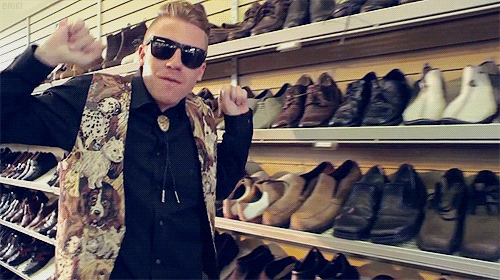
(do your buyers shop like Kanye or like Macklemore?)
Extras
This area can change a bit depending on what your business sells, but generally some other areas which can help build an accurate buyer profile are:
- Computer literacy. Do your buyers go mining for Bitcoins, or do they struggle to find the Any Key?
- News sources. Your customers' values will likely be different depending on whether they get their news from Fox News or Al-Jazeera.
- Hobbies. How your customers spend their free time can help you understand more about their motivations and values.
- Interviews and real-life examples. If you already have an existing customer base, take a look at your reviews and customer service experiences. How do people talk to your team, or speak about your business?
Sussing this information out
Figuring out all this information by yourself may seem like an impossible task, but it isn't! There are actually a variety of ways that you can find the information you need to build a series of effective buyer personas, which are:
- Asking your team and colleagues. As I said earlier, if your business is already customer-facing you can speak to team members who interact with your customers to build complete profiles.
- Check your website stats. This should be obvious, but if not some things to look for are: keywords people used to find your website, where your visitors came from, and the actions they took while they were on your page. If your website doesn't have Google Analytics installed, back the hell up and install it before coming back to this article. Your analytics tool is one of the best tools at your disposal for understanding customer behaviour.
- Use social media. Look for services or products similar to your own and spend some time analyzing the discussions happening on Facebook, Twitter, LinkedIn, and on blogs. People are more likely to share negative experiences than positive ones online, which can provide you with important insight into the areas where your buyers feel your industry could be doing better.
Why does this process matter?
This may seem like a lot of work (and trust me, it is!) but taking the time to investigate and research your potential customers and to create well-rounded buyer personas can go a long way towards helping you understand your businesses' strengths and weaknesses. Spending time on this process helps your business provide a better experience for your customers.
Still want a little more help creating an effective buyer persona? Check out these free buyer persona templates from HubSpot. They're what I use day-to-day, and I'm sure you'll find them to be invaluable, as well!
How do you create buyer personas for your business? Do you have anything to add to what I've outlined in this post? Tweet at me or tell me in the comments!
A Guide to Working Your Side Hustle While Keeping Your Day Job
- by Alyson Shane
Let's face it: there's nothing worse than feeling like you're stuck in your job.
I'll be honest with you: I was pretty unhappy at my old office job, and the biggest thing that kept me going there day after day was knowing that I could go home and work on my business.
Knowing that I could go home and pour my energy into something personal that mattered to me kept me going on a lot of days when I wanted to throw in the towel.
However, whether you're building your biz on the side, hustling your freelance gig, or working on other creative projects, it can still be tough to be able to put the effort in when you spend the bulk of your peak productivity hours at the office.
If you're serious about accomplishing your goals outside of your 9-5 then it's time to start planning, getting organized, and taking steps to make the most of your out of office hours.
Luckily, I just went through this experience, which is why I'm here to help:
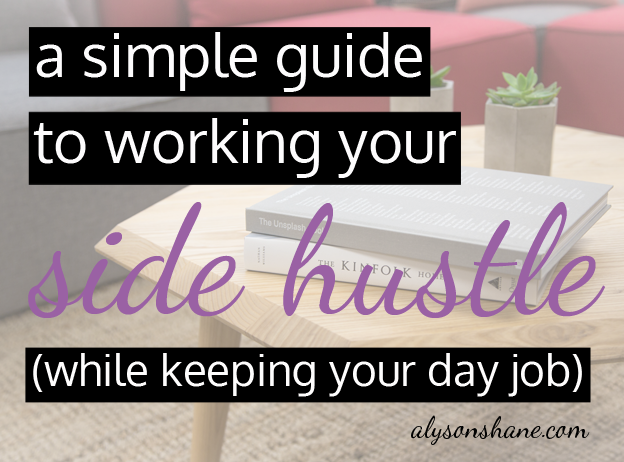
Figure out how much time you have (and be honest!)
So we already know that you have -40 hours a week to work on your side project, but it's also important to factor in other important areas of your life that can't be avoided and take up your time. Some of these can include:
- Commuting to and from work
- Going to the gym/general fitness
- Preparing and eating meals
- Socializing
- Sleep
The easiest way to figure out how much time you really have is to map it out so you can get an accurate look at how much time you really have, and how much time you can realistically spend each week.
I know that a few hours here or there may not look like a lot, but don't get discouraged! Make every hour count.
Plan, plan, plan!
Your time is limited, and if you're working on a particularly large goal, or something with lots of steps to complete it can feel like an impossible task to fit it all into your after-work hours. Don't sweat it, baby, it can be done! It just takes a little planning and preparedness.
The first thing you need to do is figure out what your goals are. They can be as vague or as specific as you'd like, but the most specific you can be, the better.
Some examples are:
- Write and publish an ebook
- Redesign and launch your website
- Put together an e-course or workshop
- Hustle your side business and grow your client base
These are all top-level goals: they're the end result, but to get there will take lots of smaller, much more manageable steps. What I used to do was sit down on a weekly or bi-weekly basis and figure out what I wanted to work on that week, and focused my attention on competing those tasks.
Prioritize and re-assess often
Once your top-level goals are in place and you've mapped out how and when you'll be taking steps to get there, it's time to prioritize your time. When you're doing lots of stuff and living a busy life it can feel hard to know what to start with (believe me!) so I find it's helpful to determine what "priority" tasks are. This is what mine look like:
- Client work and tasks that generate income
- Time-sensitive tasks, or tasks on a schedule (my newsletter, for example)
- Work that needs to be sent to someone else so they can move forward on their end
- To-dos on my business development goal list
It's important to take this seriously! It's way too easy to get wrapped up in small details, or to waste your time on something that doesn't really matter. Remember: your after-hours time is at a premium, so treat it that way.
Schedule similar tasks together
After a long day at the office it may feel like it makes more sense to say, write a blog post one night and draft your newsletter the next, but practicing "batch scheduling" can help you optimize your time and get more done.
"Batch scheduling" is exactly what it sounds like: grouping similar tasks together to optimize your time. This is especially important when doing tasks which require you to get into a "flow" such as writing or other creative pursuits. It takes time to get in and out of flow, so it makes more sense to group similar tasks together so you can stay in that mindset as you move from one task to the next.
It's also important to try and schedule your after-work work on nights when you aren't feeling mentally worn-down. You probably won't feel like sitting down and working on your financials after a busy day of meetings at the office, for example, so try to schedule mentally taxing tasks on days when your 9-5 is more low-key, and vice-versa.
Take time off
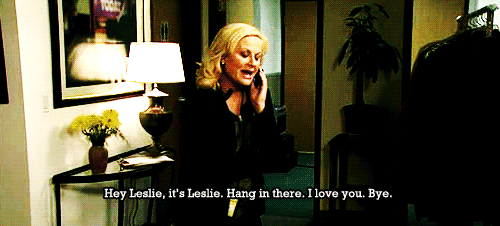
When you're hustling on the side of your 9-5 it's really easy to fall into the habit of working 24-7 (trust me on this one, I know it all too well) but if you don't schedule in time to rest and recharge your batteries you will burn out. Not only will your side projects begin to see the strain, but your productivity at your 9-5 will begin to slip as well, and that's not good!
With this in mind, schedule time to catch up on the latest Game of Thrones, go for a hike with your friends, or basically do something that isn't working on your side project when you're not at work.
Taking the time to look after yourself ensures that you'll have the steam to keep firing on all cylinders, both at your 9-5 and at your side gig, for a long time.
Do you have any tips for working on your side hustle while keeping a day job? I'd love to hear them!
20 Must-Watch TED Talks for Creatives & Entrepreneurs
- by Alyson Shane
Regardless of how much you love what you do, there are inevitably doing to be times when you're feeling down, or uninspired, or are simply suffering from a lack of motivation (I know those feels).
When I'm feeling down I like to find a fun project to work on (like doing some writing, editing photos, etc) and put on a good TED Talk to listen to while I work. I love hearing other people's thoughts and stories, and have actually been using TED Talks to get inspired since 2007, when I worked a mind-numbingly dull job as an accounting assistant in a government office. I hated my job, and listening to people with big ideas, dreams, and goals made me feel a little less crazy for being underwhelmed with my current circumstances.
These days I certainly feel a lot better about what I do day-to-day, there are still times when a little verbal pick-me-up is required to get those creative juices flowing again. With that in mind, I wanted to share some of my favourite talks to help you stay motivated:

*I also happen to have ASMR, and for those of you lucky enough to experience the same lovely sensations when listening to people speak, I've put a little asterisk next to the ones that give me the best kinds of brain-tingles.
Inspiring Talks
I'm a sucker for a good cheesy talk, and nothing snaps me out of a funk faster than listening to a few talks about dreaming big and going for it. In particular I'd recommend checking out Amanda Palmer's talk; hearing hers was pivotal for me in learning to ask other people for help and admitting that (gulp!) maybe I don't know everything.
Steve Jobs: How to Live Before You Die
Simon Sinek: How Great Leaders Inspire Action
Adam Grant: The Surprising Habits of Original Thinkers
Dan Pink: The Puzzle of Motivation
Amanda Palmer: The Art of Asking
Business & Success Talks
I've been listening to talks about business since... well, long before running my own business ever crossed my mind. In particular I'm drawn to talks that tackle issues like healthy workplaces, finding work that matters to you, and spreading your ideas successfully.
Bill Gross: The Single Biggest Reason Why Startups Succeed
Barry Schwartz: The Way We Think About Work is Broken
Scott Dinsmore: How to Find Work You Love
Seth Godin: How to Get Your Ideas to Spread
Dan Ariely: What Makes Us Feel Good About Our Work?*
Yves Morieux: As Work Gets More Complex, 6 Rules to Simplify*
Creativity & Happiness Talks
Two of the talks in this category are ones I've been listening to for several years. They're always good to come back to when I need a refresher that creativity isn't something that just disappears (though sometimes it feels that way) and that I have to actively work at being happy.
Matthieu Ricard: The Habits of Happiness*
Carol Dweck: The Power of Believing That You Can Improve
Ken Robinson: Do Schools Kill Creativity?*
Dan Gilbert: The Surprising Science of Happiness
Tim Harford: How Frustration Can Make Us More Creative
General Interesting Talks
Below are a few of my favourite talks that didn't really fit into any of the above categories, but I find myself revisiting again and again because they're just that good.
Ole Scheeren: Why Great Architecture Should Tell a Story*
Yanis Varoufakis: Capitalism Will Eat Democracy -- Unless We Speak Up
Yves Morieux: How Too Many Rules at Work Keep You From Getting Things Done*
Dan Gross: Why Gun Violence Can't Be Our New Normal
Do you have any favourite videos that you play to stay motivated and find inspiration? Tweet them at me or tell me in the comments!
Being a Small Business Owner: 5 Things You Need to Know
- by Alyson Shane
Today I did a "big kid" business owner task and complied all of my information to send to my accountant for tax time. It was stressful, a little bit chaotic, but ultimately felt good to be done and over with.
The reason it took me so long (and caused me more than a little anxiety) is because when I started my business a year and a half ago I didn't expect it to scale so quickly, and as a result I kind of floundered through the first few months of it without real systems in place to help me stay organized.
Now, boy do I know better.
Largely what I know has come through trial and error, but I've also had some great discussions with friends, colleagues, and mentors who have helped me figure this stuff out and get on the right track. And, since sharing is caring, I figured I'd share a list of 5 of the most important thins I've learned with you:
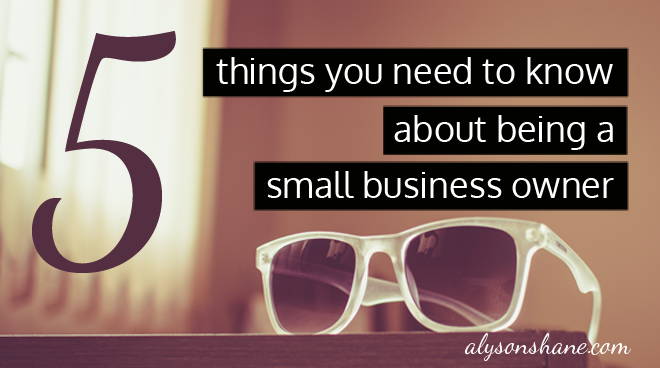
1. Every day is unpredictable
This is probably the biggest understatement of the century! I do my best to be as organized as possible and use checklists and planners, but sometimes a client throws a curveball my way which eats up my entire day.
As a result, I've had to learn to be a lot more flexible. Not just with my time, but with my expectations of what I planned to accomplish during that time. Clients will often send pressing need-to-handle emails moments before they actually need something, or someone will call me while I'm in the middle of writing an in-depth piece, or any variety of things. Whatever the case, be prepared for the unexpected.
2. Developing your systems early on is a lifesaver
Believe me, you'll thank yourself later. Like I mentioned at the top of this post, when I first started freelancing I didn't give much thought to how my folders were organized, where my invoices went, how I tracked my time... you get the drift.
Do as I say, not as I do. Here are some tips to develop strong systems:
- Pick a file structure and stick to it. Be consistent in your folders and sub-folders!
- Use invoice numbers to keep track of your invoices, and use a spreadsheet to track what's outstanding and what has been paid (I recently started doing this thanks to a conversation with my friend Elise and it's a lifesaver)
- Track your time. I use Toggl to keep track of everything I'm doing, and review my logs often to figure out what I'm spending the most amount of time on.
- Use the heck out of your calendar.
3. You'll think about work constantly
When you own something and you're trying to build it, it's almost always on your mind, and that's totally okay!
In fact, it's probably the thing that is going to make you successful and keep your business from going under, because if you're always thinking about it, then you're more likely to come up with new ideas, systems to streamline your processes, and ways to hustle your product or services.
I'll be honest: if you're the kind of person who wants punch the clock and then forget about everything you did Monday to Friday, then this isn't the lifestyle for you.
4. You'll always have stuff to do
This can actually feel overwhelming from time to time, because even when I've checked off all of my client "to dos" there's still a long (looooong) laundry list of things that I need to take care of to make sure my business is running smoothly. This could be anything from developing new products, to researching a new social trend, to filling up my content calendar... there's never a dull moment.
There are definitely times when this can feel overwhelming, but that's totally normal! Just take a deep breath, grab a glass of wine (or whiskey), pump some music and push though the first few items on your to-do list. Trust me, once you've checked a few off you will feel a million timed better.
5. You'll feel guilty when you "switch off"
(but do it anyway)

It's important to have rest days and days where your eyes aren't glued to your computer screen, or you don't set foot in your store (if you have a brick-and-mortar business) because - trust me on this - you will burn out, honey. Even if you can't entirely unplug, set aside a few hours of "me time" and take a bath, hit the gym, grab a greasy burger with your besties... whatever you need to do to unwind and recharge your batteries.
When I was on vacation in Central America for three weeks I definitely had bouts of "oh my god, will my business be there when I get back?!" but you know what? Being away from the day-to-day tasks helped me come up with some really terrific ideas, and when I came back I felt 100% refreshed and ready to dive headlong into things. I highly recommend vacations, even short ones, specifically for this purpose.
The truth of the matter is that there are a million other things you "need to know" about running a small business (which I'm sure I'll get around to blogging about at some point!) but what it really boils down to is that it's a crazy, intense, rollercoaster of fun, stress, and good vibes.
All my luck to you in your small biz adventure!
Want more posts like this? Tell me what you'd like me to blog about next on Twitter, via email, or in the comments!
How to Get Your Start as a Digital Marketer
- by Alyson Shane
A few weeks ago, while travelling around Central America, I received a comment on my Instagram which I wanted to take the chance to respond to here on the blog. Here's the question:
How did you get started doing social media marketing? I am interested in this but have no current knowledge of marketing.
-Brittany T.
Instagram isn't the best way to answer a questions like this in an in-depth way and I've been chomping at the bit to get home and write a longer, more detailed response because I wish someone had told me all of this stuff back when I was trying to figure out what I want to do.
Not only because it's great to hear what other people did to get to where they are in life, but also because being a digital marketer isn't really something that anyone worth their salt can just start doing successfully. That's because there's a lot of ongoing effort that goes into crafting a personal brand that people (freelance clients or future employers) will feel comfortable handing their social profiles over to.
So without further ado, here we go:
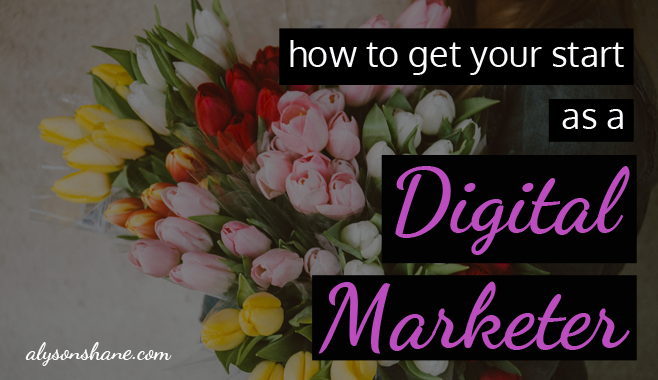
Build your personal brand
Your "personal brand" is exactly what it sounds like: it's the image of yourself that you project out into the world through your words, your actions, and your behaviour.
What's beautiful about the internet is that you can craft your personal brand to reflect whatever parts of yourself you'd like to accentuate.
This takes time. People aren't going to start recognizing your name overnight, and
The more time you spend working on and crafting your personal brand, the stronger your image will be and the sooner opportunities will start coming your way based on people's perceptions of you. Your audience will see you as a sincere, intelligent person and will be breaking down the door to work with you. I wrote more about personal branding here.
Build a badass website
I've said this before, but your website should be the centre of everything you do online; all of your social media feeds should attempt to drive traffic back to your website, and it should clearly and succinctly explain to people who you are, what you do, and what you're about.
Make your website as easy to navigate as possible. Try to aim for a slick, clean layout without a lot of clutter, and try to use bright, eye-catching photos. Personally I prefer websites with a white background and dark font, because it's easier to read and looks cleaner, but do what works for you.
Start blogging
I've been blogging since 2003, and the latest iteration of my blog (what you're reading right now) has been active since 2009. In that time I've transitioned from being a "lifestyle blogger" to someone who, largely, writes about their profession, but what matters is that I've been publishing content online for a long time.
Regardless of the topic, maintaining a blog for an extended period of time looks great professionally. Here's why:
- It's the best way for you to showcase who you really are in more than 140 characters.
- It shows that you can commit to an ongoing project (blogging).
- It demonstrates your writing skills.
Blogging has helped me establish myself as someone who understands their industry, is a strong writer, and has allowed me to expand my audience. My blog has allowed me to speak at MBlog, get published in the Winnipeg Free Press, and even to get featured on ShawTV as one of Winnipeg's Hottest Bloggers. When I was applying for jobs all of my employers checked out my blog, and it's the first place most of my clients find me nowadays.
But... what if you hate writing?
I get asked this question a lot, and to be honest I never really know how to respond to it. In my view, people who are interested in social media enough that they want to do it professionally should have a deep interest in how we communicate online and how we use persuasive language (aka rhetoric).
Because let's be serious: someone in my position spends most of their days writing in one form or another. Maybe it's website copy, maybe it's scheduling tweets, maybe it's writing a blog post or a newsletter, but either way all day every day, we're hustlin' writing.
If you don't like writing and understanding the nitty-gritty of how we communicate with each other... maybe this isn't the profession for you.
Having a social media presence
I can't stress this one enough.
If you are genuinely serious about pursuing a career as a social media manager or digital marketer, you need to jump into social media feet-first and do your best to maintain an active presence on platforms which will help you get a bit more well-known. I prefer Twitter for this purpose, personally, but if you don't have at least a Facebook profile, Twitter presence, and Instagram account, it's unlikely that prospective clients will take you seriously.
This is because how well you manage your own accounts gives people an insight into the kind of person that you are (are you nice online, for example), demonstrates that you know your way around at least a few of the major communication platforms, and shoes that you're relevant because you update them all regularly.
Oh, right: update them all regularly. This is key. Nobody is going to take someone who sells their services managing and understanding social media platforms seriously if their last tweet was from 2014.
Not just that, but social media is the easiest way to share that blog content that we talked about earlier. Cross-promoting yourself across a variety of social networks is one of the easiest ways to get noticed by a potential employer or client.
Show up to local Meetups
This expands a bit on the earlier point about building your personal brand: while connecting online is great, it's important to turn those digital connections into real, face-to-face ones, and the easiest way to do that is to show up to things.
If you're in Winnipeg, there are plenty of opportunities to connect and get known. Some of them are:
- Winnipeg Social Media & Technology Group
- BANG! Business and Networking Group
- I Love Marketing Winnipeg
- Secret Handshake (I'm usually at this one - say hi to me if you see me there!)
Not in Winnipeg? Check out Meetup.com for local social media-related gatherings near you!
Let your passions drive you
I believe that being passionate about what you do is the single most important asset in this equation.
While I make my living as a digital marketer, I actually identify as a writer. That's it. I love to write, and am obsessed by rhetoric (aka persuasive language) and the ever-evolving nature of social media, so applying what I love to do (writing) to something that interests me (communication/social media) just made sense.
If you aren't passionate about what you do, then you won't take the time to explore it and understand it, and part of being an effective digital marketer is keeping up with the ever-changing trends in your industry. Not just that, but if the idea of developing marketing plans for Instagram, or spending your days monitoring @ mentions on Twitter doesn't make your heart go pitter-pat, then you may want to rethink your career choice.
A lot of this comes down to perspective, too: like I said, I identify as a writer above all else, and managing social media profiles, developing copy for marketing strategies, and keeping up-to-date on how to effectively communicate on each platform (to hashtag, or not to hashtag? That is the question!) is just another way to sharpen my writer's chops.
So, figure out what you love the most about social media and make that your focus.
Hopefully that helps, Brittany! Good luck to you on your career journey!
Do you have any questions for me about being a business owner, digital marketing, social media, or anything I mentioned in this post? Ask me in the comments or drop me a line - I'm always happy to hear from you!
How to Build a Killer Digital Marketing Strategy
- by Alyson Shane
We live in tumultuous digital times, my friends. New social networks seem to be appearing every day, and if you're trying to promote your business online, it's easy to feel like there are too many options to choose from.
Most clients I talk to when we first meet have an ad-hoc strategy when it comes to promoting themselves online; they know of a few social networks and have accounts set up, but in many cases their messaging is muddled, unclear, and in many instances they are trying to reach an audience who simply aren't there.
That's why developing a digital marketing strategy is so important. Having a strategy which has taken into consideration both your brand's needs and those of your audience and customers can make or break your marketing efforts, so today let's go over some steps to build a badass digital marketing strategy to help you stand out online:
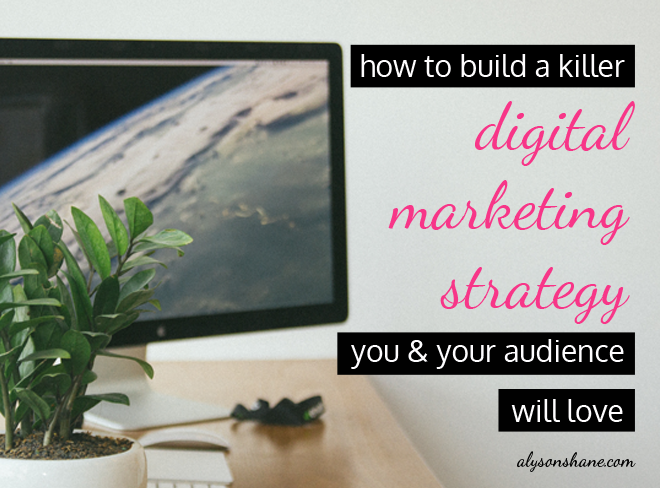
Determine your goals
The first thing I ask a prospective client is: what do you want your digital marketing strategy to accomplish? Many people have never thought about this before, and if you haven't until just now, that's okay! But now is the time to start thinking about what all the time and effort is going to do for you.
When I was in university, I took a few business courses where I learned about two crucial acronyms for planning that I still use every day: SWOT and SMART.
SWOT stands for Strengths, Weaknesses, Opportunities, and Threats, and is helpful when planning a project or new business venture so you can assess (you guessed it) your strengths and shortcomings before moving forward.
SMART stands for Specific, Measurable, Attainable, Realistic, and Timely. When planning out your goals for your digital marketing strategy, make sure that they all meet this set of criteria. What do you want to accomplish and how will you measure it? What are realistic and attainable goals to aim for?
Understanding your SWOT and SMART goals will help direct your time and energy, so you don't waste time floundering around, trying this or that, instead of having a focused and easy-to-understand set of goals.
Ask "Why me?"
What I mean by this is: ask yourself why your business exists.
What does your organization (or your small business) do that makes you worth working with? Are you a Twitter whiz? Do you write fantastic, eye-catching copy? Are your presentation and PowerPoint (or Keynote) skills second-to-none? How do your skills and your personality set your business apart from your competition?
This may take some digging and soul-searching, and that's okay! Many of us (myself included) have had to take a hard, critical look at our business and suss out what makes us unique, and how we can convey that to our audience and potential customers.
Tell your story
Crafting a narrative about your brand is one of the most important things you can do online. Your story -what makes you unique, different, and perfectly posed to solve your customer's problems - is what sets you apart from your competition.
Humans are natural storytellers, and people will be attracted to and remember a brand whose story made them feel something. Positive feelings also lead to feelings of trust, comfort, and help shape your brand's identity not just as a company, but as somewhere where real, dedicated people work and put their energy into.
(Want more info on brand storytelling? Check out my post Marketing Your Brand Through Storytelling)
Build your buyer personas
A buyer persona is exactly what it sounds like: a fake profile of the kinds of people you want to attract and engage with online.
A complete persona should have details about the person's background (I like to name my buyers, too), what they do for a living, what their values and beliefs are, what they like and don't like, and what motivates their decision-making process.
Developing buyer personas is one of the most important steps you can take as part of your digital marketing strategy because it gives you a deeper insight into what your ideal customers are looking for online. This information will inform the kind of things you say, what you share, and the people you connect with online.
Identify where your audience will be
This is critical to implementing a successful digital strategy because if you don't take the time to figure out where your target audience is hanging out online, then you'll never be able to reach them and show them how awesome you are.
That's why doing a buyer persona is so important: it doesn't just inform what to say and how to say it, but also where you should be saying it for maximum impact. For example, if your target audience are Etsy obsessed DIYers who love Pinterest, spending all your time marketing on LinkedIn, which is a business networking site, isn't going to help you find your audience anytime soon.
Take time to think about where your ideal customers will be spending their time thinking about the things that interest them online, and how you can make yourself stand out so they notice you.
Track your success & pivot when necessary
Social networks change over time, so it's important to keep an eye on how successful your digital strategy is, and to fine-tune as you go along. Paying attention to the statistics of each social media account (and your website, if you're blogging, too) can go a long way towards informing what kind of content is resonating your audience, and which turned out to be rather lackluster.
What's wonderful about digital marketing is that unless you really screw up, your audience will usually forgive and forget about a post that didn't catch their eye, or a tweet that didn't go as viral as you hoped. This means you can experiment with different kinds of images, polls, contests, and more! Just track how successful each one was and try to duplicate the ones that did well.
Ask for help (if you need it)
Developing a robust digital strategy can be challenging and time-consuming, and even when brands and businesses have buyer personas they often can't (or don't want to) spend the time reaching out to them and connecting.
That's totally okay! You are not a machine designed for selling and promoting, and if you feel overwhelmed at the thought of having to run your business and develop and implement a digital marketing strategy, that's normal.
Many people choose to work with business consultants, who can help you determine the right direction for your company and develop a killer digital strategy to go along with it (I recommend Kyla Roma if you're in the market for someone; she's fabulous). There are also people like me who offer content management services to help keep you on track (shameless plug, haha).
There's no shame in asking for help, so if you're feeling baffled or overwhelmed make a point to reach out to someone and get the ball rolling on developing and implementing your shiny, new digital marketing strategy!
Do you have any questions about digital marketing? Do you want to know more about how to implement a killer online strategy? I'd love to know!
In My Community: Speaking to Red River College's Creative Communication Students
- by Alyson Shane
Earlier today I had the pleasure of speaking to students in their first year of the Red River College's Creative Communications program (aka #CreComm) about the state of social media, blogging, and the future of digital communication with my longtime internet pal Liz Hover.

(Really digging my Neil DeGrase Tyson hands in the bottom left, by the way)
This is actually my fifth year returning to speak to students in the program (my first time was in 2011 - how time flies!) and every year it gets better; not just because I get to see new faces and have brand new discussions, but because as my life has changed I've become better suited to be able to speak on these topics, going from a university student, to a university graduate, to being employed full-time and finally to running a business where I literally blog and do social media all day.
As usual, we didn't have enough time to cover everything that I wanted to speak about, so I wanted to cover a few topics that didn't really wrap up during my time with the students today.

Merging My Personal Brand & Business
I started off as a lifestyle blogger in 2003, back on LiveJournal, and spent a number of years blogging rather aimlessly and not with a lot of purpose. I blogged frequently, sure, but it was usually just about what I'd done on the weekend, or a video I liked, or whatever.
What I had at the time was a strong personal brand, but as I started to think more critically about my craft I wanted to write about my weekends less and less, and about social media, content marketing, and being a business owner more and more.
Blogging for my business gives my blog a sense of purpose, and has provided me with a theme to tie together a lot of topics and ideas which would have seemed weird to write about as a lifestyle blogger.
During our talk Liz turned to me and said "I like your blog now; you seem a lot more happy and positive" and that's because I am. My lifestyle blog chronicled a time in my life where I was largely unhappy and trying to figure myself out, and as I've grown, learned, and gained happiness and confidence as a result of running my business it's translated into what I write here on my blog.
It's totally okay (and normal, and expected) that your blog will change and grow as you do over time - that's okay! We're in a constant state of self-discovery, and our blogs and websites should be a reflection of that.
On Having Anxiety & Being Open About It
One of the things that we touched on in the class, and which several students asked me about afterward, was how I dealt with being an anxious person, and what led me to decide to share some of my personal struggles with my audience when some of them could be potential clients.
I first wrote publicly about my issues with anxiety for Bell Lets Talk Day in 2015. The post is called Living With the Mean Reds and it was one of the most popular posts I've ever written. Since then I've blogged about my progress, which apps I've used to help manage it, and even written about my falling-out with my family, and creating a family of choice to move forward in positive and constructive ways.
None of it is easy to write about, and one of my other family members cautioned me that writing about this side of my life may actually alienate potential employers or clients. My response to that is: if having anxiety or issues with my family stops someone from wanting to work with me, then we wouldn't have been a great fit anyway.
I'm going to do what I want and the kinds of people who respect and appreciate what I have to say will find me and want to work with me. It's worked out great so far.
Besides that, as our digital world becomes less and less private, the onus is on us as individuals to take the time to craft the narratives we want about ourselves online. Sure, you can't control what other people say (remember The Dirty? Omg) but going out of your way to craft your own narrative is an important part of creating your personal brand because even though we like to paint pretty pictures of ourselves online we all know deep down that there are hard times and dark days, and part of being an authentic and relatable human being is being honest with yourself and your audience about your struggles, even if that's challenging sometimes.
What If Blogging Isn't Your Thing?
Creative Communications students have to blog as part of their curriculum, and during our talk we touched on the fact that - let's face it - blogging may not be for everybody. Which I agree with; writing isn't easy for some people.
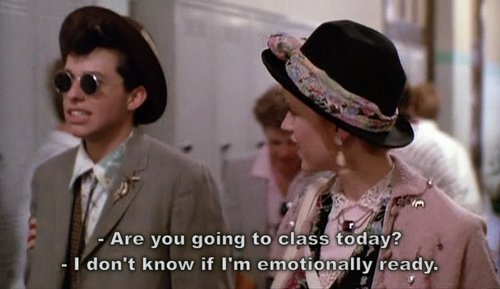
However, I do think that it's important that young people who are entering job markets which require them to be creative (eg: digital marketing, advertising, public relations, etc) should make a point to find a way to express themselves creatively online in a way that they can point to in an interview and say "this is mine."
Blogs also don't have to last forever. My good friend Luke is running year24.com a blog about (you guessed it) his 24th year. This project is on the easy side because he set the parameters himself, and there's a concrete start and end date. What matters is that he made a decision to do something creative and challenging, and was successful in doing so.
But maybe you really hate blogging for yourself, and the idea of holding a camera not attached to your iPhone scares the living daylights out of you. What can you do?
There are a variety of things: start a killer Instagram account about your pet like Liz did; reach out to publications online and start writing for them (one of the very first places I was published online was The Spill Magazine, for example); start interviewing local business owners that you admire and compile them on a website; create and grow a killer Pinterest community; you get the drift.
What matters is that you demonstrate that you're constantly learning, looking for new challenges and opportunities, and can present what you know in a fun and accessible way. The sky is really the limit!
Want More?
Do you have questions about blogging, social media, or how the heck I got to where I am?
Are you a teacher interested in having me visit your class to speak about blogging, social media and digital marketing to your students?
Drop me a line! I'm always happy to have a quick email exchange, a lunchtime chat, or even an after-hours pint at the Yellow Dog. Looking forward to hearing from you!
*As always, thanks to Kenton Larson at Red River College for having me!
How to Take a Real Vacation While Running Your Own Business
- by Alyson Shane
With my Central American vacation extravaganza coming up tomorrow (gulp!) , I've been experiencing a higher than usual degree of anxiety around my business. This will be the first time that I'll really be "away" from my work in any real capacity, and I'm starting to realize why only 9% of the 200 business owners interviewed in a survey by OnDeck allowed themselves to take a full two-week vacatio.
This is really distressing news! Relaxing and taking a break is crucial to being productive and happy, and it provides much-needed downtime away from all the screens and stresses of everyday life. Even better, with recent advances in technology business owners can work from virtually anywhere, meaning that they can check in and give themselves peace of mind that their hard work isn't crumbling to pieces while they're on the beach.
However, in order to go away on a vacation and not lose your mind, there are a few steps that you can take to help alleviate anxiety and keep things running properly while you're away. Here are some which have helped me:

1. Have someone you trust step in for you
If you manage a business with a few employees, then speak to one of them about handling some of your more pressing duties. Having someone that you trust, whom you know can handle themselves in a crisis and won't burn your business to the (figurative) ground will go a long way towards making sure you aren't stressing out the entire time you're gone.
In my case, I'm getting someone I trust to handle my client's accounts while I'm away. I've planned out as much content in advance as I can, and made my clients aware of a very strict cutoff date for info pertaining to pressing ads and marketing campaigns, so that way all that person has to do is a bit of community management (ie: replying to Tweets and comments as needed).
2. Communicate your expectations
If you run a service-based business like I do, communication is key. This is great day-to-day advice, but is especially applicable when you're about to go away on vacation. Keeping your clients or customers in the loop goes a long way towards building trusting relationships, and helps set their expectations as to what you can reasonably do while you're away.
To illustrate: last week after the holidays ended I sent all of my clients an email with a friendly post-holiday message, and a reminder that I'm going out of town. Now they know the exact dates I'm leaving and returning, as well as the final submission date for any content they need created or scheduled. I also asked them to think of any upcoming events or promotional opportunities, and to let me know ASAP so I that I can plan ahead to make sure nothing gets missed.
I also let them know that, while I will be checking my email from time to time, I'll be in the jungles (or beaches!) of Central America and have no idea what the wifi will be like, so it may take me a few days to respond. By communicating expectations in advance, both parties know what to expect.
If you have employees, make them aware of what you expect them to do while you're away. Having a checklist or defined list of tasks and goals can go a long way towards helping them stay motivated in your absence, and defines clear expectations so there's no confusion.
3. Set boundaries
The point of a vacation is to peel yourself away from your screen.
As someone who literally makes their living online, I know that I'm going to struggle to not keep my face buried in my iPhone screen the entire time, and honestly this is giving me some anxiety.
I'm lucky that a lot of the places we're going will probably have pretty slow, spotty wifi, which will help force me off my phone, but if you're going somewhere with a strong connection, like a resort or somewhere that isn't in the middle of the Guatemalan jungle, then setting rules like "I only check my email in the morning over coffee" can go a long way to keeping you sane.
Not just that, but having a rule for when you "check in" can also help your clients and employees (if you have them) know when to expect to hear from you, and when the best time to get in touch with you will be.
4. Use collaboration tools & group chats
There are a variety of collaboration tools online such as Slack, Asana, Evernote, BaseCamp, and Trello (my personal fave) which you can use to stay in the loop about various projects and opportunities. By making the most of these tools you can communicate and catch up with your team or clients quickly and effectively, leaving more time to hang out and relax.
In the event of a crisis, tools like Google Hangouts and Skype are great for having a quick chat to solve the problem. This can work great for employees who are stressed out during a crisis, or a client who is having a meltdown while you're on another continent.
How do you keep from going crazy when you go away on vacation? Tell me in the comments!
